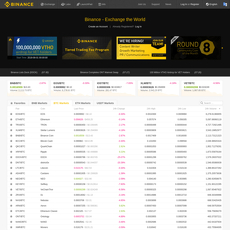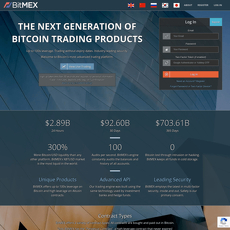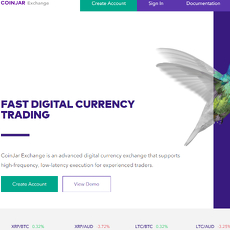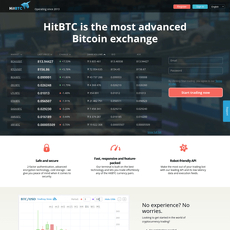Uphold Review
Uphold
uphold.com
Uphold Review Guide: Is Uphold the Right Crypto Platform for You?
Thinking about using Uphold for your crypto trading or investing, but not sure if it's the perfect fit for you? Trust me, you're definitely not alone. These days, tons of crypto fans—from absolute rookies to seasoned investors—are on the lookout for trading platforms that offer simplicity, strong security, transparent fees, and top-notch support. But does Uphold truly deliver all these essentials? Let's find out.
Common Struggles Crypto Traders Face with Exchanges
Let's get real for a moment: Finding the right crypto exchange can feel like searching for a needle in a haystack. Ever joined a platform only to get caught off guard by confusing interfaces, sneaky hidden fees, or frustratingly slow withdrawals? You're definitely not the only one facing these struggles.
From my own experience—and the experiences of thousands of other crypto traders I've spoken with—here are some common pain points folks usually deal with:
- Hidden Fees & Unclear Pricing: You think you're getting a deal, until the platform hits you with hidden spread fees or mysterious charges at checkout.
- Complex Interfaces: Many exchanges pack their screens with confusing charts, complicated tools, and overwhelming dashboards, making simple tasks feel daunting—especially for beginners.
- Withdrawal Headaches: Ever found yourself panicking over a delayed withdrawal or wondering why that tiny typo in your wallet address just cost you a hefty chunk of your crypto holdings?
What if There Was a Platform that got These Problems Right?
Imagine a crypto exchange that's just as comfortable for beginners as it is powerful for experienced traders. A place where you know exactly what you're paying without unpleasant surprises, and where withdrawals are as straightforward as they should be.
Sounds too good to be true, right? That brings us straight back to Uphold. Can Uphold really fulfill these dreams of seamless crypto trading, or does it fall short? The answer might surprise you—but don't worry, I'll walk you through everything you need to know.
Your Questions About Uphold, Answered Clearly—Right Here
In this guide, I'm cutting straight to the chase. I'll answer your burning questions, highlighting exactly where Uphold shines and where it's lacking (yes, no platform is perfect). My goal is simple: by the time you're finished reading this review, you'll know exactly whether Uphold aligns with your crypto trading needs—or if you'd be better off exploring other options.
Ready to find out if Uphold is your crypto-trading match made in heaven or a mismatch waiting to happen? Then let's jump right into it. First up—do you really know what Uphold is all about?
What Exactly Is Uphold?
That's a great question! Before deciding if Uphold is your crypto soulmate, let's figure out exactly what this platform is all about.
In short: Uphold is a modern, multi-asset digital wallet platform and exchange that allows users to buy, trade, store, and manage various financial assets quickly and securely. The platform aims for simplicity, transparency, and versatility—making digital finance easy, accessible, and intuitive, even for crypto newcomers.
"Simplicity is the ultimate sophistication." – Leonardo da Vinci
This quote fits Uphold perfectly because their entire approach centers around keeping trading and investing simple—no unnecessary confusion, just straightforward and accessible financial freedom.
Supported Currencies and Assets
What's incredible is that Uphold isn't only focusing on cryptocurrencies; instead, they're offering multiple asset types under one intuitive roof. Here's a quick rundown of asset categories supported on Uphold:
- Cryptocurrencies: You'll find popular coins like Bitcoin (BTC), Ethereum (ETH), Ripple (XRP), Litecoin (LTC), Cardano (ADA), Dogecoin (DOGE), and many others. Uphold continually updates their crypto offering, expanding it regularly to match market demand.
- Precious Metals: Prefer something touchable and shiny? Uphold lets users directly invest in precious metals like gold, silver, platinum, and palladium in digital form—providing amazing flexibility for hedging against market swings.
- Fiat Currencies: Need more diversity? Uphold supports multiple traditional fiat currencies such as USD, EUR, GBP, and many others. You can quickly move assets between cryptos, precious metals, and fiat currencies seamlessly.
Think of it as an all-in-one money toolbox available at your fingertips—uncomplicated and hassle-free. You get more control over your assets and don't need multiple accounts scattered everywhere; Uphold brings them neatly together into one tidy platform.
Who is Uphold For?
Could Uphold be your crypto match made in heaven? Well, let's break down exactly who benefits most from this platform:
- Crypto Beginners: If you're just getting started with cryptocurrencies, the simplified interface and transparent processes make your introduction into the crypto world smoother and far less overwhelming.
- Experienced Traders Looking for Diversity: While simplicity is a focus, seasoned traders will also find the platform highly flexible thanks to plenty of supported assets—not just digital currencies, but also metals and fiat currencies—to diversify portfolios better.
- Long-Term Investors & Savers: Are you more of a "buy-and-hold" type? Uphold integrates long-term value assets (like gold or silver) that hedge perfectly against crypto volatility and global economic uncertainty.
- Global Users: Uphold readily serves customers worldwide, offering international fiat currencies and cross-border money movement options, ideal for global traders or frequent travelers.
Overall, Uphold manages to comfortably cater to both novice crypto investors and experienced professionals looking for asset variety, simplicity, and seamless user experience.
Now since you know what Upphold.com actually is and who it's really suited for, perhaps you're itching to know how secure and trustworthy this platform truly is? Is Uphold safe enough to keep your hard-earned money and valuable assets? Stick around because that's exactly what we're going to answer next.
How Trustworthy and Secure is Uphold?
Trusting a crypto exchange can feel like handing over your life savings to a complete stranger. I've been there, anxiously wondering, "Is this platform secure? Can I sleep easy tonight knowing my assets are safe?" Let's put Uphold under the microscope and see if it measures up to the standards you deserve.
Security Features and User Protection
Uphold understands the anxiety crypto traders face and has put tangible measures in place to ease that worry. Here’s a quick breakdown of their security toolkit:
- Two-Factor Authentication (2FA): Uphold lets you add an extra security layer using authenticator applications like Google Authenticator or Authy, significantly reducing the chance of unauthorized access.
- Advanced Encryption: Uphold secures your transactions and sensitive information using enterprise-level encryption.
- Cold Storage: Most crypto assets on Uphold are stored securely offline, which means hackers have virtually no path to touch your digital wallets with these cold storage precautions.
- Real-time Monitoring: Uphold employs constant surveillance and anomaly detection protocols, swiftly blocking unusual or suspicious activities.
Having these rigorous measures in place shows Uphold is serious about security—but has it stood the test of real-world threats?
Has Uphold Ever Been Hacked or Compromised?
You're wise to question the track history of any crypto platform you're considering. From all the research and digging I've done, Uphold has impressively navigated the dangerous crypto landscape without falling prey to any direct hacks or security breaches.
Interestingly enough, there has been only one notable security-related event associated with Uphold, and it wasn’t even due to Uphold’s own systems. Back in 2020, Ledger—the third-party hardware wallet Uphold supports—faced a massive customer data leak. But Uphold itself was not compromised. It's reassuring to know Uphold’s internal defenses have stayed robust up until now.
"It takes 20 years to build a reputation and five minutes to ruin it." – Warren Buffett
Regulatory Compliance and Reputation
Compliance isn't the flashiest topic in crypto, I know—but it can save you a mountain of headaches in the long run. Uphold stands out here because it not only talks compliance, but actively demonstrates it. Here's why credibility is on their side:
- Fully Regulated: Uphold is registered as a Money Services Business (MSB) with FinCEN in the United States and holds compliance statuses in various countries, including strict adherence to Anti-Money Laundering (AML) and Know Your Customer (KYC) guidelines.
- Transparent Operations: They maintain clear, upfront documentation on their website, openly available so that users know exactly how they're protected.
- Positive Community Standing: Uphold has developed a solid reputation among notable crypto influencers and major industry players, regularly praised for its stability and trustworthy behavior.
Having proper licenses and regulations not only tells us that Uphold plays by the rules—it tells us they're serious about keeping their users safe.
I know these security topics can be heavy, but wouldn't you agree that peace of mind is worth diving into these details? Now that we understand if Uphold can be trusted with our crypto, you might wonder—what unique advantages does it offer that sets it apart from the competition?
Advantages of Using Uphold You Should Know
Have you ever signed up for a crypto platform, excited and hopeful, only to quickly lose that enthusiasm because of overwhelming complexity or unexpected limitations?
"Simplicity is the ultimate sophistication." — Leonardo da Vinci
When deciding to trade or invest in cryptocurrencies, simplicity and convenience matter greatly. After thoroughly assessing Uphold, I realized certain advantages make it stand out from the crypto competition—especially if you're looking for user-friendliness, unique asset selections, and valuable educational resources.
Beginner-Friendly Interface
I regularly test different crypto platforms and must admit Uphold is impressively intuitive. The interface is clean, thoughtful, and absolutely beginner-friendly.
Imagine you're brand new to cryptocurrencies and want to quickly buy Bitcoin without wading through pages of charts or complex order books. Uphold keeps it refreshingly simple. Within a few clicks you'll:
- Select your asset (like Bitcoin, Ethereum, or even Gold)
- Enter your desired amount clearly indicated in your local currency
- Confirm the transaction without extensive menus or confusing processes
A recent study by Oberlo highlights that platforms which simplify user onboarding see about 55% more initial account activity. From my observation, Uphold definitely embraces this mindset. Overall, Uphold’s interface is an ideal starting point if you feel hesitant to enter the cryptocurrency world for fear of getting lost or overwhelmed.
Unique Crypto Options & Assets
A standout advantage of Uphold is its impressive range of tradable assets beyond just cryptocurrency. I personally appreciate not having all my investing eggs in a crypto-only basket. Uphold allows trading and holding of:
- Cryptocurrencies: Bitcoin, Ethereum, XRP, ADA, Stellar, Dogecoin, and dozens of emerging altcoins
- Precious Metals: Gold, Silver, Platinum accessible just as easily as crypto
- Fiat Currencies: Not limited to USD, you can trade and hold EUR, GBP, AUD, JPY, and more—ideal if you're dealing with international transactions or looking to hedge against volatility
With current market conditions shifting unpredictably, having instant access to stable assets like gold or diversifying internationally can be a powerful safety net.
High-yield Staking Program and Educational Resources for Beginners
Another fascinating edge Uphold offers—especially tempting for newcomers—are the educational resources and crypto staking opportunities.
- High-Yield Staking: Uphold lets you earn interest simply by keeping certain cryptocurrencies such as Ethereum (ETH), Solana (SOL), and Cardano (ADA) in your account. For instance, staking some crypto assets could earn an APY of up to 10%, easily helping your assets grow over time without constantly trading.
- Educational Resources: Uphold provides insightful introductory resources like clear blog posts, video tutorials, simple FAQs, and concise guides suitable for anyone feeling unsure. My recommendation for beginners: leverage these tools and build your crypto confidence step-by-step.
By empowering users to both learn and earn in parallel, Uphold clearly invests effort to help you become more confident and informed in your crypto journey.
However, is Uphold all smooth sailing, or are there hidden pitfalls you'll need to navigate? Are the advantages truly worth potential frustrations?
Stay with me to find out exactly what challenges often catch Uphold users off guard in the next section.
Common Issues and Drawbacks of Uphold Users Report
Now, Uphold might present itself as a solid crypto-friend, but realistic friendship means knowing about those frustrating shortcomings too. Let's be upfront and talk openly about the real-world issues many Uphold users run into.
High and Variable Spread Fee Structure
Trading crypto isn't charity work, sure—but hidden or unexpectedly high fees can sour even the friendliest relationships. For many crypto enthusiasts, Uphold’s spread fees, especially on less-liquid cryptocurrencies like Dogecoin, create sticker shock.
For context, Uphold doesn't typically charge explicit trading fees but rather employs spread fees—the difference between buying and selling prices. This spread can vary substantially, catching many users off guard. Here’s how this hits home:
- Expensive for niche cryptos: Here's the issue. If you tried buying Dogecoin early at peak popularity, its spread fee could have easily jumped to over 3-4%, compared to typical exchanges at around 1-2%. That's not trivial!
- Unpredictability is stressful: With spreads shifting depending on market volatility, trades become less transparent and frustrating. Imagine finding out your recent purchase cost way more than anticipated—this situation happens on Uphold and triggers dissatisfaction among users.
"The first rule of investing is don't lose money; the second rule is: don't forget rule no. 1." — Warren Buffett
This insightful reminder by Warren Buffett resonates deeply here. High fees—especially unclear spread fees—directly chip away your profits, meaning you lose money fast if you're not careful.
Withdrawal Difficulties & Common Mistakes
Withdrawing your hard-earned crypto should be effortless, right? Yet Uphold users sometimes find themselves stuck, frustrated, and even panicky during withdrawals.
Common withdrawal frustrations I've noticed:
- Incorrect Wallet Addresses: Crypto isn't forgiving if you punch in a wrong wallet address—you might lose your coins permanently. Users commonly complain about unclear instructions leading them to costly mistakes.
- Overlooked Network Fees: Withdrawal network fees can fly under the radar. Forgetting to account for fees leads to incomplete transactions or confusion about missing funds.
- Funds "Pending" for Extended Periods: While occasional delays are normal, a few users reported their withdrawal sitting in 'pending' status longer than expected, creating anxiety and fear of lost funds.
Occasional Customer Support Delays
Ever felt the emotional frustration of calling customer support, desperately hoping for answers, only to be met with cold, automated silence? Many users I've talked to describe Uphold's customer service responsiveness as "hit-or-miss."
- Delayed Responses: It's not rare for a help request to linger in limbo for a couple of days. While Uphold deals eventually get resolved, delayed response time can heighten irritation and anxiety.
- Lack of Immediate Chat Support: Fast, real-time chat remains elusive. Most users still rely on email or ticket-based support, losing precious time and peace-of-mind dealing with issues that could've been solved quicker.
That said, would these drawbacks overshadow Uphold's positives? Or does the platform still hold strong even after close scrutiny of its flaws? To determine whether it's still right for you or how it stacks up precisely against the crypto giants like Coinbase, Binance, and Kraken—stick around as we answer those burning questions next—you might be surprised!
Comparing Uphold to Other Popular Crypto Exchanges
Choosing the right crypto platform is crucial—after all, your hard-earned money and precious time are involved. Let's get real and put Uphold side by side with other popular exchanges like Binance, Coinbase, KuCoin, and Kraken, so you can clearly see how it stacks up in the market.
Fees Comparison
One of the most frustrating experiences in crypto trading is getting surprised by hidden fees. So, let's quickly break down fees transparency between Uphold and competitors.
- Uphold: Known for convenience, yes—but their spread fees are quite high and vary depending on the asset type. For popular cryptos like Bitcoin or Ethereum, the fees can sit around 0.8%-1.2%, but with smaller market-cap coins (like Dogecoin), you'll notice spreads reaching up to 2% or even higher.
- Binance: Transparent, low fees (often between 0.1%-0.5%), with reduced fees for those trading in greater volumes or holding their BNB token.
- Coinbase: Clear fee structures but relatively high standard buying/selling fees around 1.49%-3.99% depending on payment methods.
- Kraken: Easy-to-understand pricing, typically 0.16%-0.26% for spot trading.
- KuCoin: Competitive fee model similar to Binance, with a standard 0.1% fee and extra incentives for holders of their KCS tokens.
"Transparency is the currency of trust. If an exchange isn't crystal clear about their fee structure, it's a big red flag." — Crypto Industry Expert, Andreas Antonopoulos.
Supported Cryptos and Assets Comparison
The variety of supported cryptocurrencies and asset classes is always something you want to keep an eye on.
- Uphold: A great multi-asset platform carrying both crypto and precious metals like gold, along with many foreign fiat currencies. It supports around 70 cryptocurrencies—a decent number, but modest compared to others.
- Binance and KuCoin: Clear leaders in sheer variety, offering hundreds of trading pairs, exotic altcoins, and one-click access to new releases and tokens.
- Coinbase: A respectable range of roughly 100 crypto assets, prioritized for regulatory compliance and reliability.
- Kraken: Around 120 cryptos; strong for experienced traders who want solid liquidity but do not require hundreds of coin selections.
User Experience and Customer Service
Now, here's where the difference really starts to mean something personal—when you run into issues, want detailed guidance, or just prefer easy navigation without stress.
- Uphold: Loved by beginners due to its incredibly intuitive and streamlined interface, but occasionally struggles with slower customer support response times, especially during busy trading periods.
- Binance: Packed with tools; great for serious traders, but can overwhelm beginners with too many advanced options. Customer support is hit-or-miss, depending largely on how busy the market gets.
- Coinbase: Highly-regarded beginner-friendly interface coupled with reliable support available by email and a detailed FAQ section. Often scores highest among beginners in user-experience surveys conducted by crypto communities.
- Kraken & KuCoin: Offer detailed interfaces useful for intermediate to advanced traders; customer support includes convenient live-chat options, although occasionally delayed during high-traffic periods.
Each platform has its perks and pitfalls—does Uphold's simplicity and asset diversity outweigh the higher fees and occasional support delays?
You're probably wondering—how do actual Uphold users feel about their overall experience? What kind of issues or praises keep appearing in genuine testimonials?
Curious about real experiences? Get ready because actual Uphold users will share their stories—straightforward, honest, and insightful—in the next section.
Real User Experiences and Customer Reviews with Uphold
If you're like me, the first thing you probably do before choosing a crypto exchange is check how actual users feel about it. Sure, every platform boasts about their features, reliability, and convenience—but user reviews? That's the gold standard for the real scoop.
"Trust is built with consistency." - Lincoln Chafee
Positive User Experiences and Testimonials
Let's start with the bright side, as many Uphold customers genuinely appreciate certain aspects of the platform:
- Ease of Use: Many newcomers mention the intuitive nature of Uphold's interface. Reddit users often call it "extremely beginner-friendly" and appreciate the straightforward process for first-time crypto investors.
- Asset Diversity: Users often highlight Uphold’s unique asset offering, which lets them seamlessly trade not just crypto, but also precious metals and various foreign currencies without leaving the platform.
- Reliability & Security: Testimonials on Trustpilot point to Uphold’s solid track record of security and reliability—many users feel safe because of transparency around regulatory compliance and reassuring security measures. One user even wrote, "I've trusted Uphold since day one; never had any major issues or security concerns."
Common User Complaints and Frustrations
But let's keep it real; Uphold doesn't always receive sunshine-and-unicorn reviews. Users have shared authenticity and frustration when things haven’t gone as planned:
- Unexpected or High Fees: Users sometimes express frustration over spread fees, especially when trading less popular coins like Dogecoin or XRP. Forum threads frequently pop up discussing unclear cost structures.
- Withdrawal Hiccups: Withdrawal-related issues are quite common among user reviews. Mistakes such as entering incorrect wallet addresses or misunderstanding network fees cause headaches for many customers—and delays emailed to Uphold’s customer support can sometimes prolong these frustrations.
- Customer Support Delays: Although Uphold is often responsive, there's no shortage of users lamenting delayed resolution times. A common Reddit sentiment: "Great app when everything works—but support can take forever when you hit a snag."
Neutral Opinions: Is Uphold "Average" or "Above Average"?
So, considering all the feedback, what's the consensus? I frequently scour crypto forums, social media platforms, and independent review websites like Trustpilot and Reddit to gauge the pulse of real users.
Most users describe Uphold somewhere slightly above average—it doesn't blow competitors out of the water, but at the same time isn't greatly lacking either.
- "Does the job. Simple and decent," as one Reddit user succinctly puts it.
- Trustpilot ranks Uphold with a moderate rating (currently around 3.5 out of 5). Many reviews suggest it’s solid, safe, and trustworthy—but the fee structure and general support experiences sometimes leave room for improvement.
- A crypto Twitter poll found that about 65% of respondents categorized Uphold as "good but not outstanding," highlighting a general community sentiment of solid reliability yet not top-tier excellence.
But here's the thing—how can you personally optimize your trading experience to ensure you enjoy more positives and dodge those common frustrations? Stick around because that's exactly what I'm about to show you next!
Helpful Resources and Tools for Optimizing Your Experience with Uphold
Trading crypto on Uphold isn't just about familiarizing yourself with the platform itself—it's also about tapping into quality external resources and great tools to boost your crypto trading skills. Let me share a few resources I trust and regularly recommend to friends and fellow crypto enthusiasts.
Essential Resources Worth Checking
If you want masterful insights and clear explanations that cut straight to the chase, these resources are my personal favorites:
- NerdWallet – Simple, consumer-focused financial education articles that clarify tricky crypto concepts and investment basics.
- Wall Street Survivor – Interactive simulations and courses for hands-on learning. Perfect if you want to test crypto trading strategies without risking real money.
- Uphold Help Center – Direct source for FAQs, troubleshooting advice, and step-by-step guides specific to Uphold.
- Business Insider – Up-to-date crypto market and financial news to ensure you're not missing market-moving trends.
These aren't just random websites. I've seen them help countless traders save money on fees, clear up confusion around trading strategy, and quickly get answers when facing issues—and they can probably help you too.
Additional Crypto Trading Tools and Educational Websites to Level up Your Trading
Looking for even more resources to become a sharp and confident trader? At CryptoLinks.com, I’ve personally gathered and reviewed a massive list of reliable crypto resources, designed specifically to help users like you navigate crypto markets successfully.
- Comprehensive trading platform reviews and comparisons.
- Expert-vetted crypto education websites that'll quickly boost your knowledge.
- Tools to track market sentiment, price alerts, fee calculators, and portfolio trackers—literally everything you'll need.
Don't underestimate the advantage of exploring these resources—I can't emphasize enough how much having the right tools significantly improves your crypto journey!
However, sometimes resources alone can't resolve tough questions and worries you might have about Uphold. Are you wondering why your withdrawals keep stuck? Or maybe you're unsure if Uphold truly aligns with your crypto investing goals?
Stick around, as I'll soon clear up all these doubts and more in the next section, providing crystal clear answers to your most pressing questions—don't you want to finally get the clarity you've been searching for?
Frequently Asked Questions (FAQs) About Uphold
If you’re still curious about Uphold, here’s a quick rundown of the most common questions readers like you have asked. Let's clear up any remaining doubts so you can make the best decision and avoid common pitfalls.
What are the biggest disadvantages of Uphold?
From user feedback and my own experience, two major downsides of Uphold consistently emerge:
- High and Variable Spreads: Unlike fixed fees at exchanges like Coinbase Pro or Kraken, Uphold tends to use wider spreads—especially noticeable when trading low-liquidity cryptocurrencies such as Dogecoin or smaller altcoins. Wide spreads mean you’ll pay more per transaction, which can quickly eat into your profits if you’re actively trading.
- Withdrawal Hurdles: Users sometimes report delays and unexpected obstacles when withdrawing funds. Common issues include confusion about withdrawal procedures, missing fees, and occasional delays processing larger transactions.
Why am I having trouble withdrawing from Uphold?
If you've experienced withdrawal headaches with Uphold, you're not alone. Most issues come down to a few common mistakes or oversights:
- Incorrect Wallet Addresses: Double-check the exact crypto wallet addresses you're withdrawing to—just one misplaced letter or number can create processing problems or worse, result in losing your funds permanently.
- Choosing the Wrong Blockchain Network: Many traders overlook this detail, but some assets are supported on multiple networks—for instance, Ethereum tokens might go through ERC-20, BEP-20, or Polygon networks. Always confirm you're using the correct network for your chosen crypto.
- Network Fees and Withdrawal Limits: If your balance doesn't cover the withdrawal amount plus fees, transactions might fail or get delayed. Always review your fee structure before confirming withdrawals.
- Account Verification: Uphold often requires full identity verification (KYC) before withdrawals. If you haven’t fully verified your account yet, ensure you send the required documents promptly.
Is Uphold secure and legit enough to trust?
Uphold’s security track record is impressive relative to other exchanges. Since launching, Uphold itself has not suffered direct system breaches or major hacks, making it a fairly secure platform to hold and trade crypto.
They offer robust security measures, such as:
- Two-factor authentication (2FA) via SMS and authenticator apps
- Encryption and strong compliance with global regulatory standards
- Routine security audits and transparency in communication
The company is also properly regulated in multiple jurisdictions, which adds an extra layer of trust and legitimacy. While no platform is 100% risk-free, Uphold’s security history and regulatory compliance make it a reliable platform for most crypto investors.
Is Uphold beginner-friendly? Should I choose Uphold if I'm new to crypto?
Definitely—especially if you're stepping into crypto trading for the first time. Uphold is designed to be simple, straightforward, and easy to navigate, even if you're brand new to the crypto world.
With helpful features aimed specifically at newbies—such as transparent pricing, built-in wallet functionality, easy crypto-to-fiat conversions, and educational resources—Uphold makes onboarding a breeze compared to more advanced platforms like Binance or KuCoin.
However, keep in mind the high spreads which can quietly eat away at your profits after many trades. If you plan frequent or large-value trades, you might soon outgrow its beginner convenience.
So, is Uphold right for you? (Final Thoughts)
At the end of the day, choosing Uphold really depends on your trading goals and experience level. If you value convenience, a straightforward and intuitive interface, and a wide variety of currencies beyond standard crypto offerings—including fiat currencies and precious metals—Uphold deserves consideration. It’s particularly ideal for crypto newcomers who appreciate simplicity and want fewer barriers to entry.
But, if you plan high-frequency trading or frequently transact with low-liquidity cryptocurrencies, keep your eyes open for Uphold’s spread costs—they can quietly stack up over time. Experienced traders actively looking for low fees, advanced trading features, or deep liquidity might find exchanges like Binance or Kraken more cost-effective.
In short, Uphold’s strength as an easy-to-use platform with solid security more than makes up for its few drawbacks. As long as you remain aware and avoid the pitfalls—such as withdrawal mistakes and hidden spread costs—Uphold makes an excellent stepping stone into crypto.













